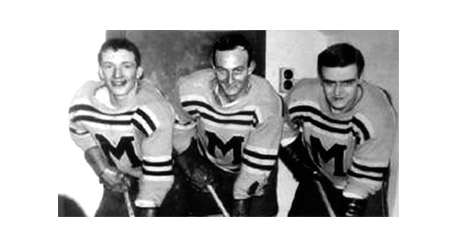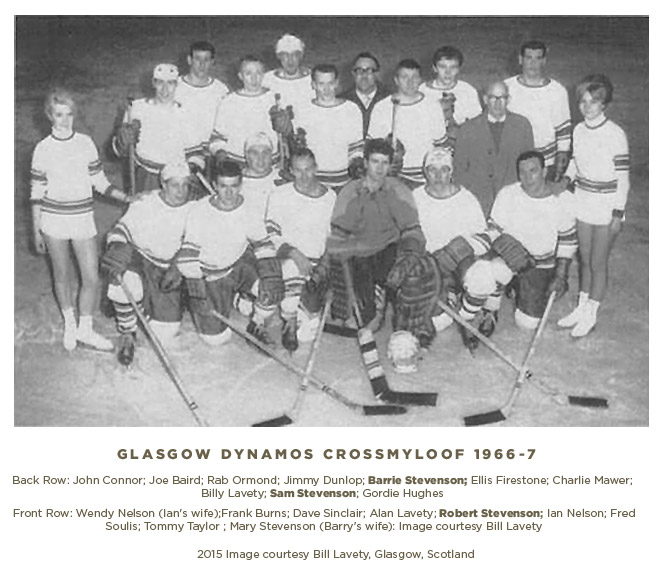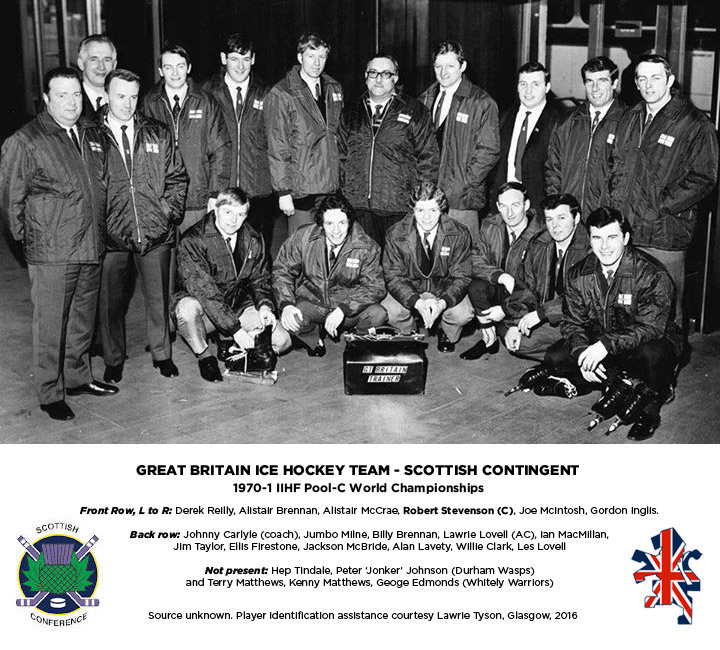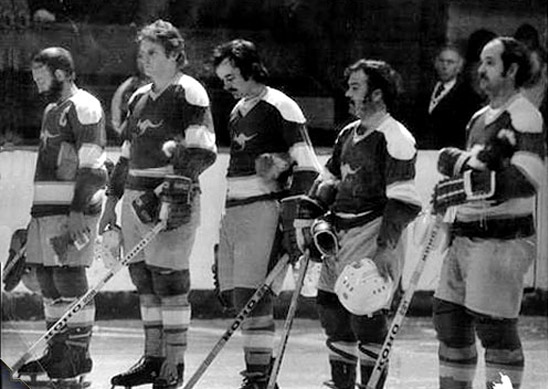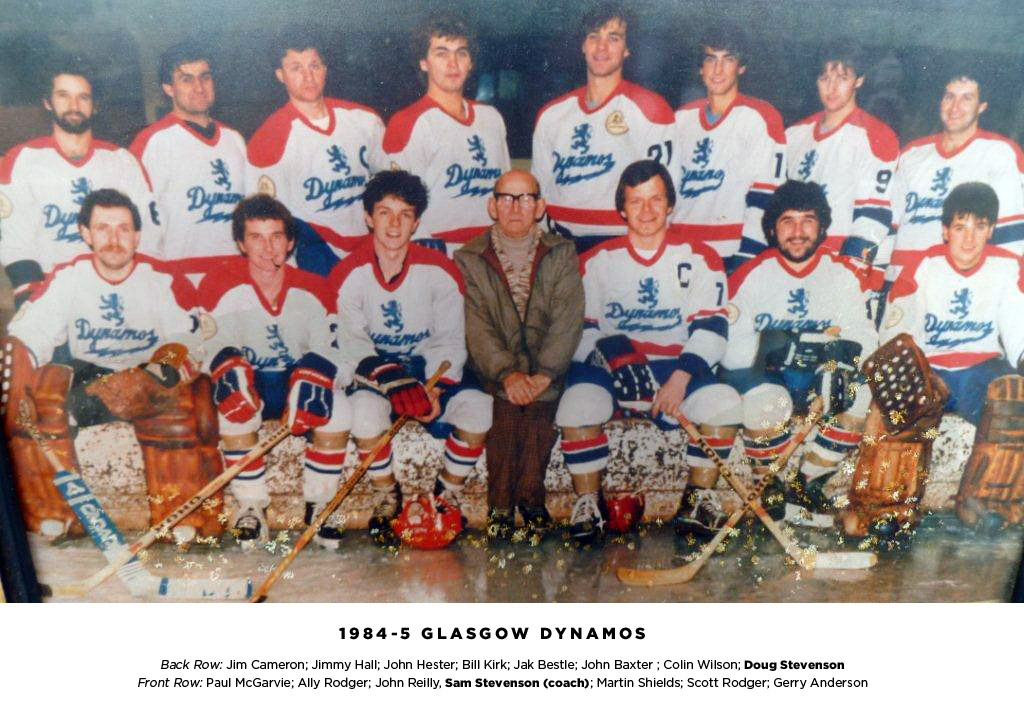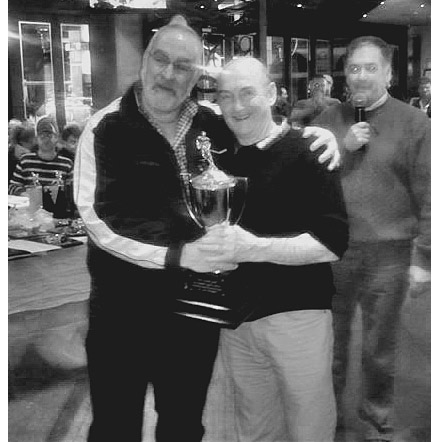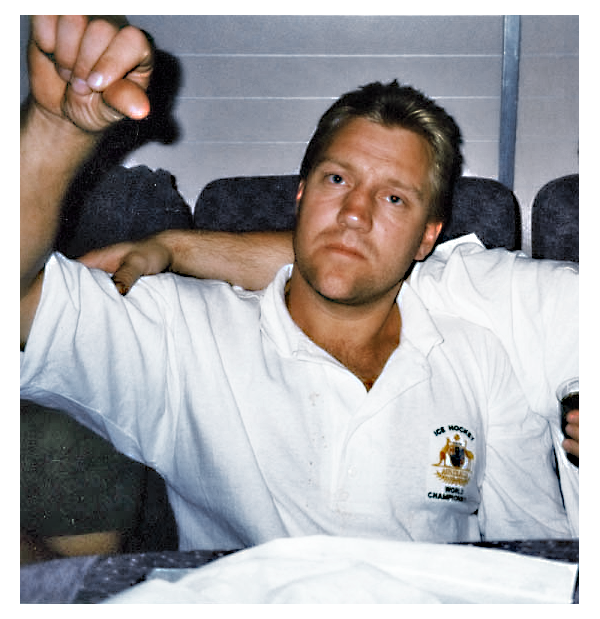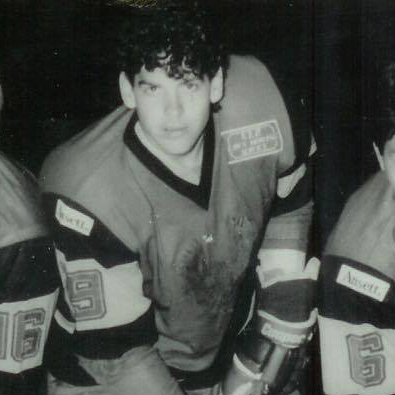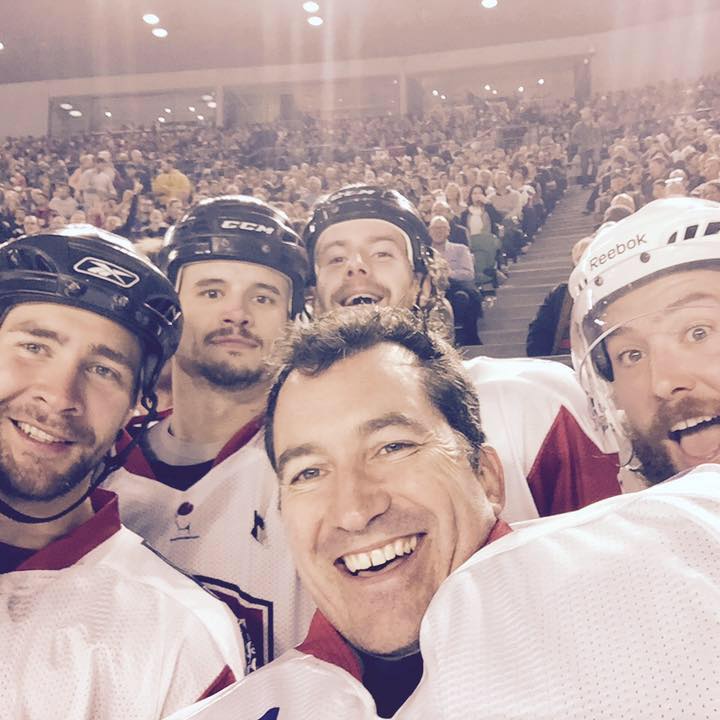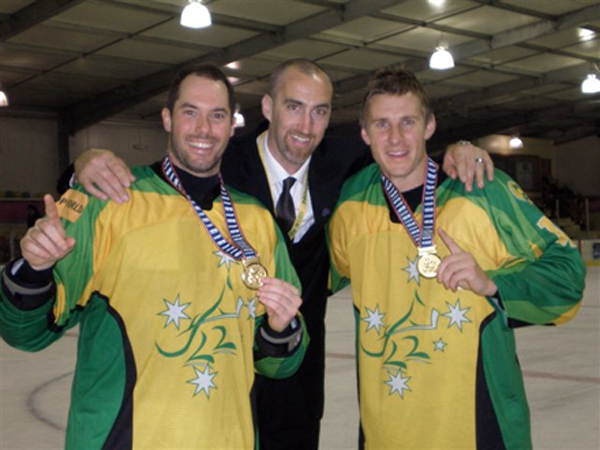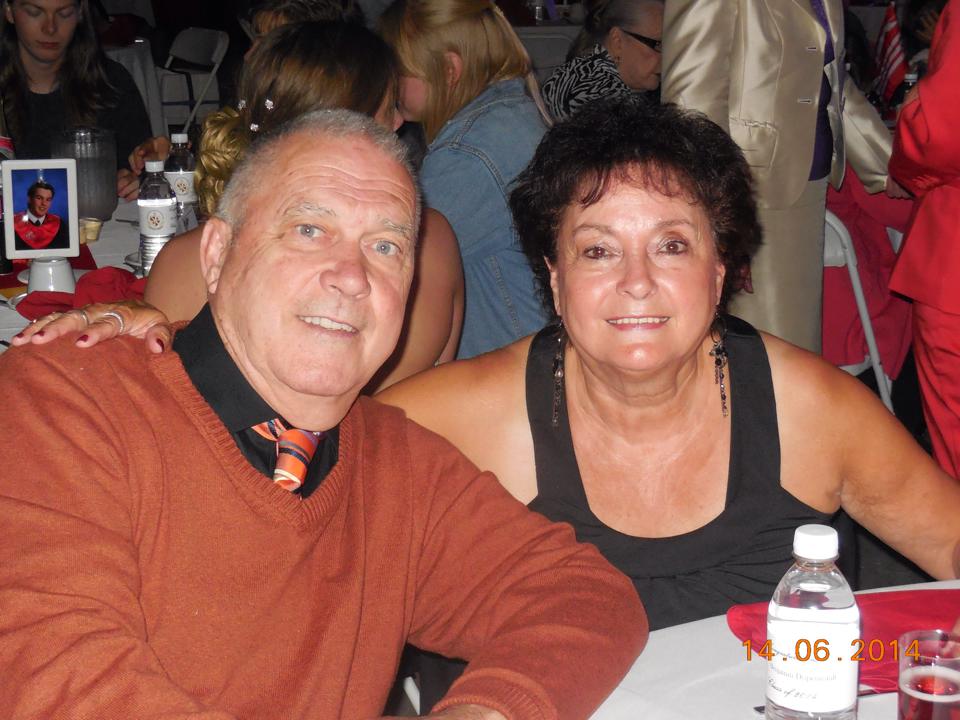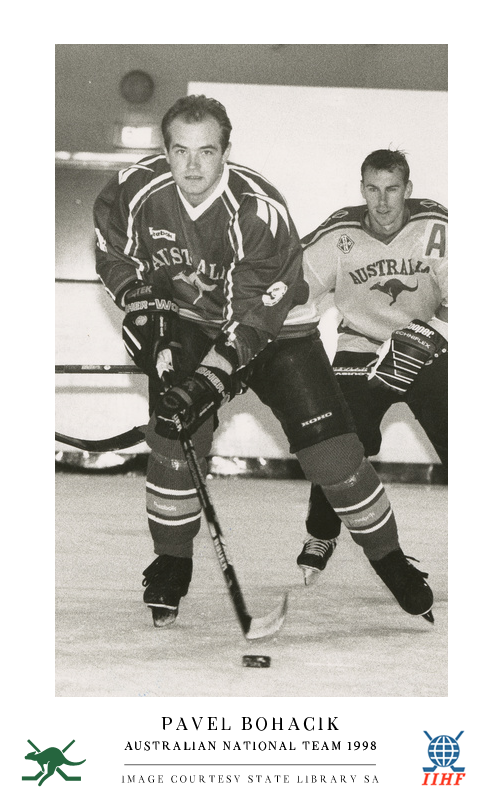Legends
home
1936 1st AUSTRALIAN Winter Olympian
1947 1st International Figure Skating GOLD Medallist
1960 1st Australian Olympic and World Championship ICE HOCKEY Teams Squaw Valley California USA
1961-2 2nd AUSTRALIAN Ice Hockey World Championship Ice Hockey Team Colorado USA
1963-4 2nd OLYMPIC Qualification ICE HOCKEY Team Tokyo Japan
1987 1st International Ice Hockey MEDAL Perth Australia
2008 Ice hockey World Championship PROMOTION TO DIVISION I Newcastle Australia
Robert Alexander STEVENSON (Robbie, Stevie)
(1939 - )
BORN ON THE 20TH FEBRUARY 1939 at Hamilton in South Lanarkshire, Scotland, he was raised at Langside Road on Glasgow's southside. His father Sam was centre-ice in the Sottish National League for Kelvingrove, Dennistoun Eagles and Glasgow Mohawks from 1929 until 1938 when he last played for Glasgow Lions. Then manager-coach of the amateur Mustangs, Glasgow Mohawks and finally the Glasgow Dynamos where he remained until the age of 82, coaching his grandson Doug in the 1980s. [589] Sam was inducted to the Ice Hockey Journalist UK Hall of Fame when it was revived in 1986, where he is referred to as "the Grand Old Man of British, and especially Scottish, ice hockey".
Robbie was introduced to hockey when he was just 7 years-old. He could play the piano as well as the puck and sat the entry exam for London's Royal Academy of Music. He attended Calder Street Secondary and Strathbungo Senior Secondary schools in Glasgow, and became an apprentice joiner. Known as "Stevie" in Scotland, he was only 13 when he made the Mohawks in 1952, mentored by Canadian-born Jim Kenny, a former player turned rink manager at Crossmyloof.
But it was Billy Brennan who Stevenson has credited with developing his aggressive competitiveness — Mohawks coach from 1959, the year after they moved to East Lane Arena at Paisley in Strathclyde. Under Brennan, Stevenson became the fine all-round player and prolific goalscorer fans remember. He represented Great Britain in B-Pool when they were ranked 14th in the world — at Stockolm in the 1963 Worlds, Finland in 1965, and Zagreb in Yugoslavia in 1966 — until his country dropped-out for some years. He was a Paisley Mohawk when they won the 1964-5 Scottish League title and then the 1965-6 BBC Grandstand Trophy, defeating Fife Flyers in the final at Kirkcaldy, 4-1. But in 1966 he returned to Crossmyloof to be the foundation player-coach of the Glasgow Dynamos in the new Intermediate League that was soon to evolve into the Northern League, one of British hockey's successes.
The first Dynamos were young and inexperienced but Stevenson's coaching more than compensated. Acknowledged as a key factor in the club's success he developed forwards such as John Hester (1950- ) and Martin Shields (1954 - ) who went on to become future Northern League champions and national team players. Under his tutelage the Dynamos quickly advanced to championship play-offs for the Icy Smith Cup. They were 1967 British Champions in just their second season, and two-times runners-up in their fourth and fifth seasons. They won the Spring Cup in 1969-70 and Stevenson himself was top point scorer in the Northern League for the first four seasons, winning the Earl Carlson Memorial Trophy 1966 to 1969, and an All-Star 5 years straight, 1967-71. He produced 253 goals and 168 assists in 5 seasons, averaging just under 4 points per game, well ahead of his nearest rivals. [590]
After a 4-year absence, Great Britain re-entered the international arena at the 1971 C-Pool World Championships with Stevenson as captain. He combined on the power forward line with two other UK Hall-of-Famers, the wingers Jackson McBride and Les Lovell. They finished fourth behind Romania, France and Hungary but it was Stevenson's crowning glory. Because by then he had played against some of the world's top-15 hockey nations, collecting 31 points from 26 world championship games along the way. He worked as a carpenter in a shipyard on the QE2 liner during those years with teammate McBride, then his own heating installation company in Glasgow. He had married Eleanor and had four children by the time he accepted the position of player-coach of the Melbourne Tigers IHC in Australia, on the recommendation of former Dynamos' right-winger, Dave Sinclair, who had emigrated 3 years earlier.
"Dynamos Star To Emigrate Soon", screamed the Hockey Herald that month, "... An outstanding stickhandler and playmaker, Stevie will perhaps best be remembered in the years to come as the man to whom scoring goals was as easy as falling off a log. Even as a thirteen year-old with Glasgow Mohawks he received frequent tellings-off from the late Jim Kenny for scoring too many goals and not concentrating enough on playmaking". [590] He emigrated with his family at the age of 32 in April 1971, leaving the Dynamos the third most successful team in the circuit since 1966, after having begun the least experienced. In a letter back to the Glasgow Hockey Herald that year, Stevenson explained how he missed the first five games in Melbourne, then played a scoreless first game within 24-hours of getting off the plane. But he did go on to say he was top goal scorer by the end of his third game, and "had 23 goals in his first seven outings." [591]
Stevenson won at least 3 Goodall Cups in 1972, 1973 and 1976 during the years Elgin Luke was coach, the last when he was 37 years-old (1975 is not confirmed). He played for the Rangers IHC in 1972 and won both the VIHA President's Medal and the John Nicholas Trophy (Goodall Cup MVP) for a record two consecutive seasons, 1972 and 1973. The former was awarded each year to the Best and Fairest player of the Victorian league by the votes of referees. In 1977, he was captain of Victoria representing Australia against the touring West German team at Olympia 80 in Melbourne. Yet, he did not represent Australia at the Worlds in 1974, even though his club sponsor here had insisted upon a full clearance from the International Ice Hockey Federation. "It was a prominent condition of the agreement", reported The Glasgow Hockey Herald, "suggesting Australia may be planning a return to the World Championships spear-headed by Britain's top scorer". [590]
Australia did return, but without Stevenson, and the reason was unlikely to have been age-related. He was the same age as Charlie Grandy, for instance, who had played in 1974 and then again in 1979 at the age of 40. Stevenson had just changed continents with a young family, making it unlikely he would have paid to play and subsidise officials as required here. His father Sam lived through all of this until his death at Glasgow in 1995, at the age of 92, and his son seems set to similarly endure. He plays veteran hockey with the Melbourne Nite Owls winning MVP of the AJAS Cup, the 55-years and over category of the OiHAN Australian Masters Tournament. It earned him the Rocky Padjen Trophy in May 2011 at the age of 72.
Robert Stevenson was small in stature for his heyday but during the 1960s and early 1970s he was an outstanding centre-ice for Paisley Mohawks and Glasgow Dynamos, a captain of Britain who scored 18 goals for his country, a coach of champions. His career as both player and coach in local and state ice hockey in Victoria is longer than in Britain, spanning over 4 decades. He was inducted to the Ice Hockey Journalist UK Hall of Fame in 2003. His son Allen played for Great Britain Under-19s at the 1983 European Junior Championships in Sarajevo. His son Doug represented Australia at Barcelona in Group C of the 1979 Ice Hockey World Championships and went on to play in the Heineken League of the mid-1980s with Glasgow Dynamos, Ayr Bruins and Dundee Rockets. [589] Doug returned to Australia and played A-grade hockey for Melbourne Blackhawks into his late-forties and the AIHL Melbourne Ice in 2004-5. He then briefly coached the AIHL Melbourne Mustangs, and is presently coach of the IHV Melbourne Demons and the AJIHL Melbourne Glaciers.
Images | 01 | 02 | 03 | 04 | 05 | 06 |
Notes:
[1] It was a decade after the closure of Glasgow's original Crossmyloof Ice Rink (1907-18) before a larger rink of the same name was built there. The Scottish National League was based solely at Crossmyloof until the 1936-37 season. The original was Scotland's first indoor rink. Its 1928 replacement closed in February 1986.
Vladimir MIHAL
(1956 - )
HE WAS BORN IN 1956 in Bratislava Czechoslovakia and began hockey at the age of ten for HC Slovan Bratislava. Between 1975 and 1980 he played for the army team 'Dukla Topolcany' and represented Czechoslovakia in a junior tournament (U20). He was 25 years-old when he moved to Australia in 1982 during the National Ice Hockey League era. He played for the Adelaide Tigers in the local league where he was six times top point scorer in the A-grade — 1983, 1987, 1989, 1992, 1993 and 1994. He was selected for the South Australian state team each year between 1982 and 1995, winning Goodall Cups in 1986, 1987 and 1991. After a break, he returned again between 2000 and 2002 when he was in his forties.
In 1983, the year after he arrived in Australia, he played for the NIHL's Payneham Flyers in the Slapshot tournament in New South Wales. A representative player for Australia in the 1986 and 1987 World Championships, he won gold in Perth, a member of the undefeated team that won Australia's first international ice hockey medal and set a new scoring world record. Retired from playing in 2002, he has been a martial arts instructor for the past 17 years and now works as a security guard. He has been married for 30 years and has a son who is a pilot, and a daughter, Samara, who plays ice hockey. A little legendary in Adelaide where he is fondly remembered as a playmaker with good hands, Vladdy Mihal was still running trainings for C-grade ice hockey players each week in 2016.
Images | 01 | 02 | 03 | 04 |
Arto MALSTE
(1958 - )
THE MAN WHO LED THE ASSAULT on Canberra with two goals to retain the 1987 Goodall Cup for South Australia was a native of Jyväskylä in the western part of the Finnish Lakeland. He was 27, but at 21 years-old when he was imported to play for the Adelaide Flyers in the National Ice Hockey League, he told us that Australian hockey will only develop if the organisers and people in charge concentrate on some of the younger players. That was 1980 and it seems to us those sentiments should be respected and long remembered. He played for the Adelaide Tigers in the local league and represented South Australia for many years winning Goodall Cups in 1986, 1987, 1990 and 1991.
Finland is considered a member of the so-called "Big Six", the unofficial group of the six strongest men's ice hockey nations. Born in 1958, Arto Malste had played defense for JYP Jyväskylä in Division 1 of the Finnish league, a level below Olympic selection. The nation won Olympic silver in 1988 and in those days Malste was exceptional at controlling the play in his defensive zone. He represented Australia at the 1987, 1990 and 1995 World Championships. He played for the Adelaide Reds in the 35+ Division 1 and won the 2003 John Thomas Award, the Most Valuable Player in that division of the Old-timers Ice Hockey Australia Network (OiHAN). His association with the Australian game has spanned over three decades.
Images | 01 | 02 | 03 | 04 |
Jarrod SCOTT
(1967 - )
WHEN 27 YEAR-OLD JARROD SCOTT participated in his last Worlds in 1997, he had been competing internationally for over a decade at both ends of the rink. Born in Adelaide on December 9th 1967, he first stepped on to ice at St Moritz Adelaide in Hindley Street. He attended his first hockey school at the Payneham ice rink in 1980, and after that he was hooked. He played for the Falcons Ice Hockey Club in A-grade from 1982 to 1997 and one season with the Blacktown Bullets in the New South Wales league, 1997-98. He also represented South Australia in the Tange, Brown and Goodall tournaments during those years, and sometimes all three in the same season. [620]
In 1983, he attended his first national camp. He was cut from that squad but he went on to represent Australia in the U18 Asian-Oceanic, the 1988 Thayer Tutt Trophy and the IIHF World Championships in 1990, 1993, 1996 and 1997. He played in the very first National Youth Team (U18) that competed at the IIHF Asian Oceanic U18 Championship held in Japan in 1984 with fellow South Australians Jari Hiltonen and goalie, Damian Holland. Coached by Canberra's Jim Fuyarchuk and South Australia's John Botterill, many of these young players went on to represent Australia in the national junior and senior teams.
Scott won bronze with the National Youth Team in Seoul in 1987; D-Pool silver with the Mighty Roos in Cardiff in 1990; and three Goodall Cups representing South Australia in 1987, 1990 and 1991. He played hockey in Australia for the last time in 1997. He married a Canadian girl and moved to Guelph Ontario, where the couple still live today with two daughters. He was still playing there and coaching local teams in 2016. [620]
Images | c1981 | 1984 | 1985 | 1985 | 1988 | 1997 | c2010 | c2010 | 2013 |
Damian Holland
(1968 - )
BORN AUGUST 20TH 1968, he debuted for Australia the same year his state won the Cup, one of the best new players in many years. While it is true Australia again finished last, they had improved a lot, especially at their own end. Holland was spectacular between the pipes and was invited to Toronto for a goalie camp. He went on to play in the Canadian junior system, but not before he had a hand in South Australia's first Goodall Cup in 1986. He played college hockey (NCAA) in the USA for several years where he completed a degree at the University of Illinois (1989 - 1992). In March 1987, he competed with the National Junior Team at the U20 World Championships at Granly Hockey Arena in the seaport town of Esbjerg.
He returned to the Mighty Roos in Sydney in 1989 and won silver in Group D at Cardiff in Wales in 1990. Then came a Bronze medal in 1992 at Hull in England. Canberra's Jason Elliot was in net for the 1993 C-Pool tournament held in Slovenia for a 7th-place finish, then Holland returned in 1994 for the sixth-place finish in Barcelona. In 1995, Elliot lost his passport and was left stranded in New York. He missed the Worlds in South Africa and Holland stepped-in. Australia finished with two wins, seventh from ten teams. Holland, the best goalie of the tournament, had completed a brilliant decade in green and gold. In 2016 he was goaltending coach for the Melbourne Mustangs IHC of the AIHL.
Images | 01 | 02 |
Tyler Lovering
(1971 - )
BORN JULY 13TH 1971 at Wilcox, Saskatchewan in Canada, the son of Kelly and Mary Lyn, he played for the Spokane Chiefs and the Moose Jaw Warriors of the WHL; the Notre Dame Hounds of the SJHL; and the University of Massachusetts Lowell River Hawks in the NCAA Div I. He graduated in 1989 and moved to Australia in 1995 where he represented New South Wales in defense and led the Sydney Bears in the inaugural season of the Australian Ice Hockey League (AIHL). His name is inscribed on the Goodall Cup four times — 1996, 1999, 2002 and 2007. He won the John Nicholas Trophy in 1999, the Goodall Cup MVP. On retirement after the 2008 season, he had played 13 seasons with the Sydney Bears, winning AIHL championships in 2002 and 2007.
He joined the national senior team for the 1998 IIHF Pool-D Worlds and continued each year until 2004, then again in the 2006 Worlds in Auckland where he won a fifth IIHF Division 2 bronze medal. He returned from retirement when he heard about the bid to host the 2008 tournament in Australia, and so it was he added a Division 2 gold medal to his collection of a silver and 5 bronze — a veteran of nine World Championships between 1998 and 2008, some as captain. Australia was promoted to Division 1 for the first time in 2008 and that was also the first time the nation had competed at the second-highest level since 1962. It was a win that meant many things because it happened on the centenary of ice hockey in Australia, the centenary of the International Ice Hockey Federation, and on home soil in front of a capacity crowd at Newcastle. Lovering is a founder of the AIHL and a commissioner and executive chairman following his return in 2010. He is the director of Australian Financial Publications, a financial media company.
His father, John "Kelly" Lovering (1945 - 2014), was head coach of the Australian national team in the four campaigns between 1998 and 2001. Previously, he was a chairman of the Canadian Hockey Association's (CHA) National Coaching Committee. From 1980 to 1990, at Athol Murray College of Notre Dame, he was Athletic Director, Hockey Coordinator, senior football and hockey coach and an enthusiastic and motivating educator. He mentored such future hockey stars as Curtis Joseph, Wendel Clark, Rod Brind'Amour, Gary Leeman and Dale Derkatch. His legacy to the sport are the 38 players under his tutelage who eventually reached the NHL. His passion for the game of hockey saw him serve as a coach and administrator here and all around the world in places like China, Holland, New Zealand, Japan, England, Iceland, Spain, South Africa, Estevan, Regina, La Ronge, Montmartre and Wilcox. He was presented with the Gordon Juckes Award, Hockey Canada's highest honour given to an individual for outstanding contribution to the development of amateur hockey in Canada at the national level. [618, 619]
Images | 1998 | 1999 | 2000 | 2004 | 2006 | 2008 |
Pavel Bohacik
(1969 - )
BORN PAVSTAR BOHACIK IN ZLIN, Czech Republic on 23 August 1969 he first played hockey in 1977 with HC Zlin. In September 1985, at the age of sixteen, he arrived in Australia and joined the Tigers IHC in the South Australian local league. Two years later in 1987, he represented Australia in the National Youth Team in China, winning a C-Pool bronze medal. He represented the state in the Brown Trophy and was the Most Valuable Player in 1991.
He won five Goodall Cups for his state in 1991, 1995, 1997, 2000 and 2001. He first wore green and gold for the national men's team in Great Britain in 1992 where he won C-pool bronze, then Slovenia in 1993, Barcelona in 1994, South Africa in 1998 for the silver, and again in 1999 for the bronze. He also played rugby and took up judo and boxing, but the highlight of his sporting career was being voted Best Forward in the 1994 Goodall Cup, even though he had played defence all his life.
He joined the foundation team of the Adelaide Avalanche in 1999, and was team captain in the inaugural AIHL season in 2000, and again in 2001. He retired in 2004 and works as an electrical engineer in Adelaide. Married to Michaela since 1999, they are raising two boys, now aged 10 and 12.
Images | 1994 | 1995 | 1997 | 1998 | 2000 |
© 2007 - 2016 Ross Carpenter B Arch (RMIT) M Des (Urban Design) ARAIA.
All Rights Reserved. Original Research Nov 2007.
Reproduction prohibited without prior written permission of the author except for the inclusion of brief quotations in a review.
